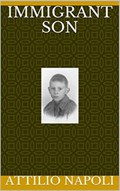Immigrating to another country is fraught with emotions that transcend anything a person can imagine. Attilio spent the first six years of his life entrenched in the culture he was born to follow. His friends looked out for him when they engaged in rock fights with gypsy kids, and he had an extended family close for support. When his parents went in search of a better life, that all changed.
At six years of age, they thrust him into adventures that would shape his life. Because of his young age, he accepted each change as a new direction that needed exploring. The situation was not the same for his parents. After the initial enthusiasm of setting out for their new land, they realised the consequences of leaving family and friends, behind.
The revelry during the voyage to Australia distracted them for a while. They made new friends and delved into what would become long-standing relationships. They also discovered new cultures when the ship Flaminia traversed the Suez Canal. Then, after bouts of seasickness as the ship sailed over sometimes turbulent seas, the reality of what was in store struck them when they reached their destination.
Wide, open, spaces represented a wilderness. The bush was a jungle to them. Then, they struggled with what they deemed primitive accommodation in the two hostels through which they shuffled. To compound their already growing fears, the food provided was foreign and, in many cases, unpalatable to them. They came to realise this was not the Promised Land the brochures extolled. Attilio’s mother was wracked with anguish when she learned what she had given up home and family for.
The family moved to accommodation in the form of a fibro garage behind a shop. They lived there for five years and discovered outside dunnies, along with the bodgies whom they saw as an alien race of their own. The arrangement served their purpose, though, because the Italian community that surrounded them provided a small level of comfort. However, language difficulties in general society hampered their integration. Years of hardship followed and, because of their lack of English, they did not know how to access support, or enjoy what the extended surroundings offered.
While his parents struggled with new customs, Attilio immersed himself in his new culture. At his new accommodation, he had the benefit of a nearby school that provided the environment to help him integrate into the Australian way of life. His many exploits led to new friends and activities. Yet, his games became a mixture of the old ones he had known, and the new ones he encountered.
Along the way, he learned that prejudices and ignorance transcend all cultures. When he wanted to play rugby league, his father would not let him because of all the taboos he associated with a game he did not understand. So Attilio played soccer instead. That was a sport his father understood and was a more traditional pastime for an Italian boy to pursue.
Following many debates with his parents, and through all the experiences that followed, it became clear to him that he had a foot planted firmly within each of two cultures.

